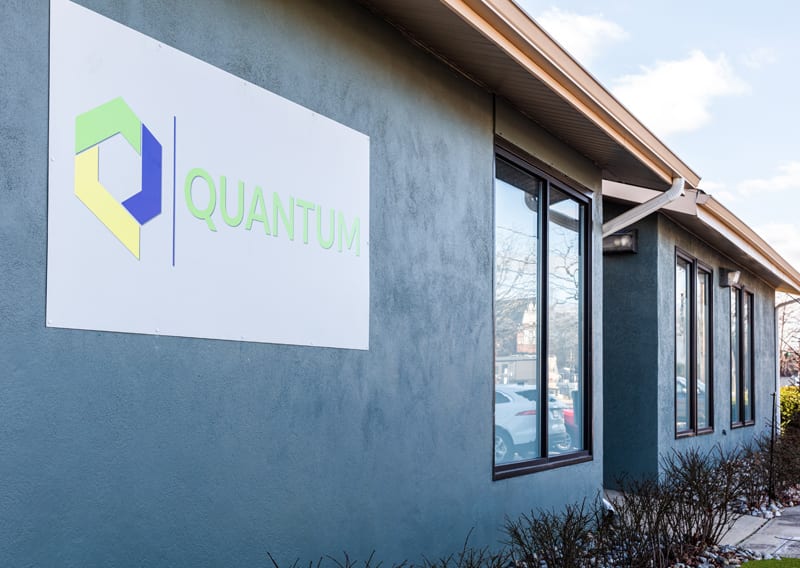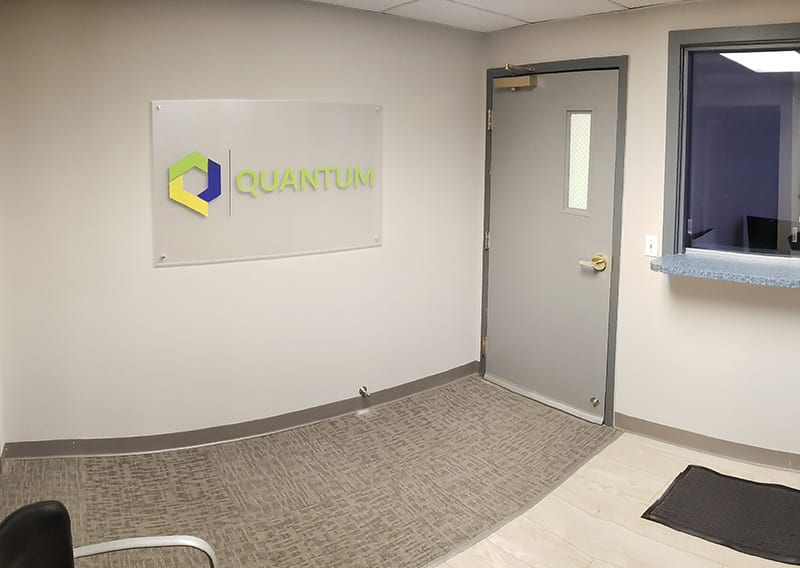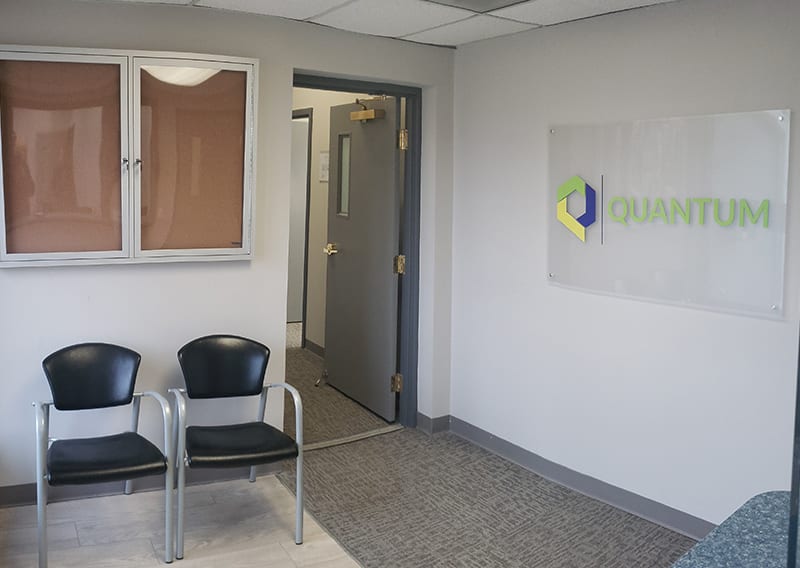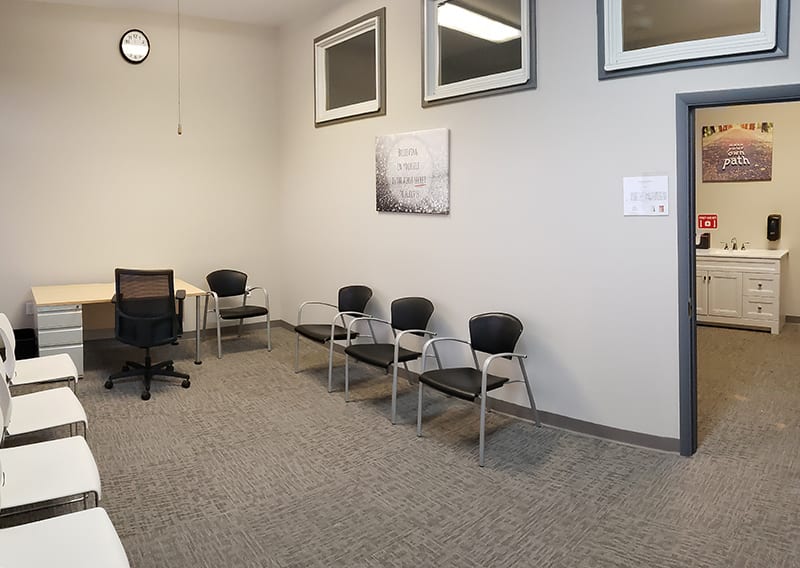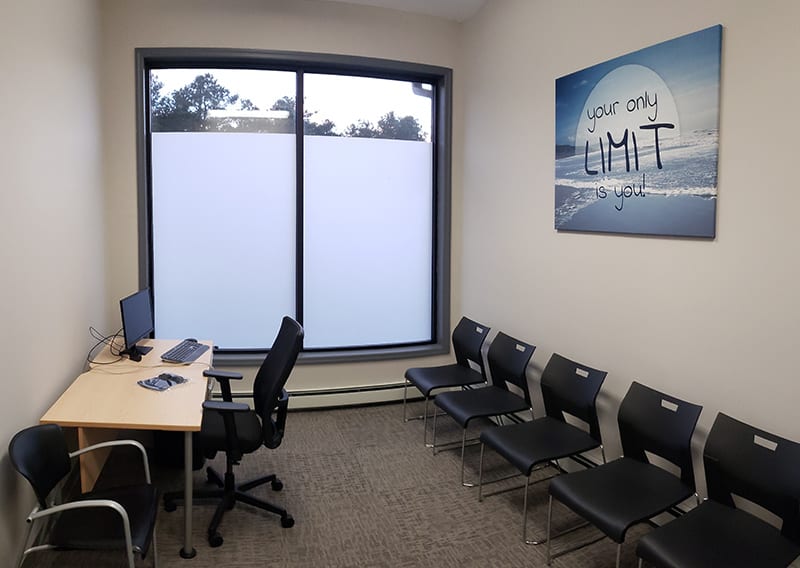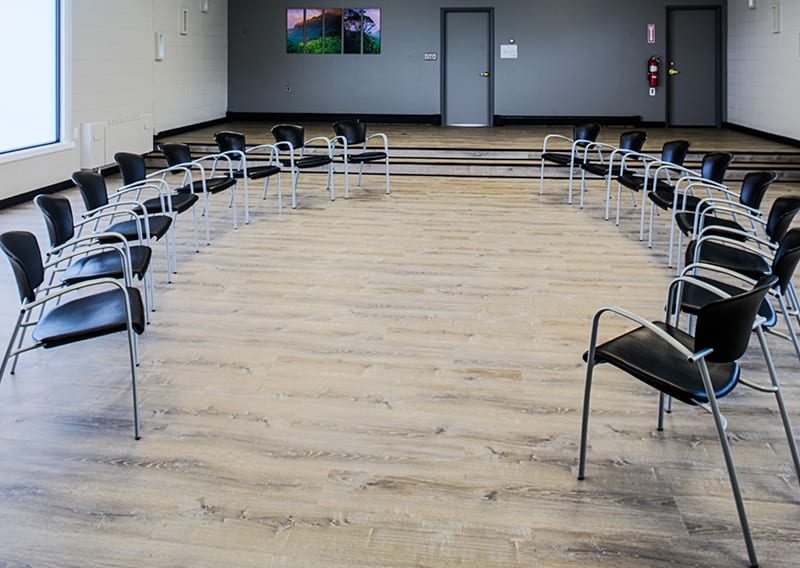Our facility is a warm, inviting, cozy, and secure environment that provides the perfect level of safety, comfort, and privacy as you receive treatment and get on your path to wellness. We’ve designed our space to allow for a low-stress environment where you can focus on your well-being.
Given the concerns of the COVID pandemic, we’re ensuring procedures are followed to create a clean environment for our patients, staff, and visitors. We’ve gone above and beyond CDC and New Jersey State guidance to design our cleaning and disinfecting protocol so that there is no question of the cleanliness and safety of our facility.
You’re here to get well and our priority is maintaining a safe, clean, peaceful, and welcoming environment for you to do just that.
To see our response to Covid-19, click here.
Photo Gallery
Click photos to enlarge
Are You Ready to Begin Your Journey to Recovery?
You could be completely covered. Verify Your Insurance Today.
The Quantum
Process Outpatient Rehab NJ
1. Make the Call
Contact our Quantum Team at
(609) 993 – 0733 to get started.
2. Complete
Your Intake
This streamlined process includes a series of questions and discussion of your unique needs and goals.
3. Get the Best Care Team Possible
After your intake, you’ll meet your Care Team, a group of amazing professionals dedicated to helping you make recovery reality.
4. On-Going Support
After you meet your Care Team, you’ll start to receive treatment based on a Care Plan that’s designed to help you achieve and sustain your recovery.
- Why Choose Quantum Behavioral Health
- Highest Rated Alcohol Detox Program
- Drug Detox Program
- Top Alcohol Rehab in New Hanover
- Drug Rehab in New Hanover
- How Much Does Rehab Cost in New Hanover?
- How Long Is Detox?
- How Long Is Rehab?
- 30 Day (Short-Term Rehab)
- Long Term Rehab (60-90 Days)
- Additional Therapies & Addiction Treatments Available:
- Does My Insurance Have Coverage For Rehab?
- MAT
- Cognitive Behavioral Therapy (CBT)
- Dialectical Behavioral Therapy (DBT)
- Rational Emotive Behavioral Therapy (REBT)
- Dual Diagnosis Treatment
- EMDR
- Relapse Prevention
- Life Skills Training
- Vocational Training
- Group Therapy
- Experiential Therapy
- One on One Therapy
- Family Therapy
- Trauma Informed Therapy (After PTSD)
- Physical Fitness
- Off Site Activities
- Holistic Addiction Treatment in New Hanover
- Anxiety Disorder
- Bipolar Disorder
- Borderline Personality Disorder (BPD)
- Codependency
- Depression
- Impulse Control Disorder
- Post-Traumatic Stress Disorder
- Alcohol & Drug Rehab for Active Military Members & Veterans
- Stresses Of Military Life for Active Service & Family Members
- Specialized Addiction Treatment for Military Service Members & Veterans
- PTSD
- Mental Health Services for Military Members & Veterans
- Why Choose Quantum Behavioral Health for Detox & Rehab in New Hanover
Why Choose Quantum Behavioral Health
Finding the right recovery center for you or a loved one who is struggling with addiction can feel like a daunting task. You will want to look for a rehab center that offers the appropriate levels of care, with individualized treatment plans that combine evidence-based therapies with holistic care, treatment for mental health disorders, medical care, and relapse prevention programs.
At Quantum Behavioral Health treatment center for those living in New Hanover, we use an integrated treatment plan in our outpatient rehab, partial care programs, and intensive outpatient programs to treat alcohol addiction, drug addiction, and dual diagnosis for co-occurring mental health conditions. All of our programs are run by caring and experienced professionals, using a combination of science-based practices, holistic methodologies, and alternative options to better help our patients achieve long-term sobriety.
When you chose Quantum Behavioral Health addiction treatment centers for substance abuse treatment, you are choosing customized care that will address your unique needs as an individual. We see each of our patients as whole people, not “just another addict”. We will get to know you on a personal level, helping you through outpatient rehabilitation using treatment approaches that are comprehensive, giving you the appropriate level of care that you need at our highly rated and affordable care facility.
Because we are an outpatient rehab facility, we can help you stop drinking and/or using drugs while you live at home or in a sober living home, returning to your everyday responsibilities, your family, your job, and school. With our help you will heal the underlying causes of your addiction with all the support, recovery strategies, coping mechanisms and a relapse prevention plan you need to remain sober long-term.
Highest Rated Alcohol Detox Program
Alcohol detox in New Hanover is not something that should be taken lightly. When the addiction is severe or when additional health complications are involved, the withdrawal symptoms from alcohol can be some of the most dangerous of any substance if not managed and monitored by medical professionals. Because of the brain chemistry changes that occur with alcohol addiction, withdrawal symptoms can vary from person to person, and they can escalate suddenly from mild irritability, headache, and nightmares to severe tremors, insomnia, shaking, hallucinations, seizures, and delirium tremens, a sometimes deadly condition.
Detoxing in a medically supervised setting within one of the many safe treatment centers in our network will ensure you remain safe. Most detox centers will have 24-hour medical care available, with medications to ensure you are as comfortable as possible, as well as to avoid high blood pressure, seizures, and other issues. Alcohol abuse treatment does not need to be scary or dangerous, and a stay in a safe medical detox facility is the best way to stabilize your brain and body, so you can get a fresh start and move forward in your treatment. At Quantum, we have outpatient plans for people no longer experiencing alcohol withdrawal symptoms.
You will stay in a safe and comfortable environment throughout your detox until you are stable enough to move forward in your treatment plan into a residential rehab program or an outpatient program. At Quantum, we offer outpatient procedures for those no longer experiencing withdrawal symptoms.
Drug Detox Program
Drug detox in New Hanover is different for each patient, depending on what drugs you are quitting, whether you were mixing drugs and/or alcohol, how long you have been using the substance(s), and your overall level of health and addiction. If you have a cocaine addiction, an addiction that is more psychological in nature, you will likely need to spend less time in medical detox than a person with an opioid addiction, but you will likely need intensive therapy and mental health care to deal with the addiction.
Because people begin abusing drugs for many different reasons, including social pressure, stress, trauma, self-medication for mental illness, or even out of curiosity, so therapy, counseling, nutrition and exercise programs, physical health care and holistic treatments may be employed during and after detox in an integrated, whole-patient approach to healing the underlying causes of the substance use disorder.
Medication-assisted treatment (MAT) is an option provided to people with opioid use disorders, benzodiazepine addictions, and alcohol addiction. It is a longer-term drug treatment program in which FDA-approved medicine is provided over a prolonged tapering-off schedule to help with drug cravings, withdrawal symptoms, and remove the “fun” aspects of substance abuse by making it unpleasant or removing their euphoric effects.
Top Alcohol Rehab in New Hanover
At Quantum Behavioral Health, we are an outpatient treatment facility for residents of New Hanover County, North Carolina. This means that, unlike inpatient rehab, in outpatient programs you do not “go to rehab” and live inside the building 24 hours a day. You will continue to live at home, or move into a nearby sober living home, living your life, and coming in for treatment on a set schedule, depending on your level of care and practical needs. To qualify for an outpatient program you must not need around-the-clock physical or mental health care.
The levels of care offered at our addiction treatment facilities include:
- Partial Care (PC) – in the partial care program you will have 20 or more hours of care every week, addressing physical, mental and emotional issues, including dual diagnosis treatment for co-occurring mental illness. Partial care programs are typically offered during the day, when the majority of staff is around and the most services are provided. This means you will likely not have a full-time job or other big commitments during PC, instead placing the focus on your recovery and healing.
- Intensive outpatient program (IOP) – the IOP is 9 or more hours per week of addiction treatment, groups and individual therapy to address the psychological, physical and emotional challenges you may be dealing with. Service in the IOP are usually provided before or after the workday, on weekends, or in the evening on a flexible schedule designed to accommodate your everyday life schedule.
- Outpatient Care (OC) – outpatient care is any program with fewer than 9 hours per week of treatments, for people who are ready to move on from the IOP but wish to remain connected to the structure and support our treatment center provides. You can stay in outpatient care for as long as you need, accessing therapy, doctor’s care, groups and our sober community resources in a customized plan designed to help you stay well long-term.
There is no need to worry about whether your insurance says you “need to step down” your treatment level. At Quantum, your progress and your individual needs are what decides your next best step, not the insurance company.
Drug Rehab in New Hanover
At Quantum, we do not offer detox or inpatient residential rehab services, and if you need that level of care, we can offer referrals to safe and effective treatment programs nearby. Our outpatient programs are designed to help those ready to begin the transition back to their everyday life while receiving continued therapy, medical care, medication-assisted treatments, and holistic whole-patient care. Some of the treatments our team offers include:
- Traditional behavioral therapy like cognitive behavioral therapy
- Group therapy
- Individual therapy and counseling
- Evidence-based treatments
- Meditation
- Yoga
- Art therapy
- Music therapy
- 12-step integration
- After work and weekend rehab programs
- Vivitrol treatments to help with alcohol and opioid relapse prevention
You will live at home or in a sober living residence, with the freedom to hang out with your family and friends, work a part-time or full-time job, and still get the best possible treatment during drug rehabilitation. Because most people who enter an outpatient rehab program do so to remain close to family, we strive to incorporate family involvement into your program if you wish, keeping loved ones informed on your progress, with family therapy, information sessions, and support groups available.
We treat the underlying causes of addiction, along with providing stress-management and coping techniques, relapse prevention, emotional release, and behavioral issues that are contributors to addiction. We also have mental health services in our partial care program for people with dual diagnosis. Through therapy, counseling, and behavioral health treatments you will heal the underlying causes of your drug addictions, work through emotional pain and trauma, gain useful recovery tools and relapse prevention strategies, and grow to understand the social aspects of addiction and drug resistance. Our facility is welcoming and secure, so you will feel safe and comfortable throughout your rehab treatment plan.
How Much Does Rehab Cost in New Hanover?
Every person’s addiction treatment program at Quantum is unique, as we offer several customizable levels of care. Some factors that affect the cost include:
- Whether you need to rent a room in a sober living home
- Which medications and therapies are provided in your plan
- How long you stay in rehab
Rehab can seem expensive at first glance, but your insurance will cover some, if not all of the cost, because mental health and addiction treatment services are considered to be essential health services. Even if you end up paying the entire bill out of pocket, it will likely be much cheaper than the amount you are throwing away on drugs and alcohol every year, not to mention future health care and hospital bills due to health issues from long-term alcohol and drug abuse.
The important thing to remember is that you only have one life to live, and you cannot put a price on that. Regaining control, repairing damaged relationships with loved ones, and recovering your mental health and spiritual wellness are priceless opportunities that rehab can afford you.
At the Quantum drug rehab center, we can help you deal with your insurance company to figure out what is covered by your individual plan, and we can also provide a quote if you will be paying in cash. Our goal is to help you, so we will work alongside you to create a plan that will work with whatever resources you have available.
How Long Is Detox?
All detox centers in New Hanover will tell you that all detox treatment programs are unique. There are several factors at play that determine the timeline of your individual substance abuse detox, including what types of substances you were using and whether you were mixing them with alcohol, how long and the frequency with which you were using them, and your individual genetics, history of drug use, mental health and physical health at the time of detox.
How Long Is Rehab?
The length of rehab depends on the type of rehab you require, as well as your addiction treatment needs, your individual therapy timelines, your budget, and your level of comfort. Inpatient rehab is usually 30 to 90 days in length, and outpatient rehab treatment plans can be customized to your lifestyle, goals, and preferences, lasting anywhere from a few weeks to years if you wish.
30 Day (Short-Term Rehab)
30-day, short-term inpatient rehab is often provided to people who have completed a detox program but are not yet ready to enter outpatient care due to ongoing health concerns, or because their risk of relapsing may be too high. An inpatient rehab program provides a 100% sober environment with 24-hour support, keeping patients away from triggers, stress, and access to drugs and alcohol. A full month in residential rehab will help create new healthy habits, build a productive schedule, and gain an outside perspective on life that can be helpful in making behavioral changes that last a lifetime. A 30-day stay in inpatient rehab sets the foundation for life-long change, especially when followed by an outpatient rehab program.
Long Term Rehab (60-90 Days)
Long-term inpatient rehab is the best program for people who have ongoing physical and/or mental health concerns that need 24-hour oversight and care. Long-term drug rehabs are equipped to help people who are still dealing with intense withdrawal symptoms, psychosis, or other issues due to heavy meth, opioid, benzo, alcohol, or other substance abuse. Not only will you have the health care you need during this difficult time, but you will also have more time in therapy, groups, and educational programs to learn coping strategies, healing underlying issues and practicing relapse prevention techniques for long-term success in sobriety.
Those with dual diagnosis treatments who cannot be left alone should not enter outpatient treatment until these concerns are under control, after which a partial care outpatient treatment plan of 20 hours or more a week will help with the transition back into normal life. It can take 6 to 8 weeks for psychiatric medication to fully kick in, so a 60-to-90-day inpatient program is often recommended.
Additional Therapies & Addiction Treatments Available:
Addiction is so much more than just a physical craving for drugs and alcohol. At Quantum Behavioral Health, we offer integrated treatments in a comprehensive program, meaning we combine scientifically proven western medicine with traditional therapy approaches and holistic treatments including yoga, meditation, art therapy, and music therapy. We also integrate 12-step programs like Alcoholics Anonymous and Narcotics Anonymous for a spiritually-leaning peer support facet of treatment.
Does My Insurance Have Coverage For Rehab?
Your health insurance legally must cover mental health and addiction treatments, but the amount of coverage depends on your policy, your insurance company’s rules, and the treatment center you choose. At Quantum, we will help you verify insurance coverage and let you know ahead of time how much you will need to pay out of pocket so you can make a realistic treatment plan for yourself. If you call our team, we will work with you to help you construct your individual road to recovery in a customized program designed to suit your needs and your budget.
MAT
Medication-assisted treatment (MAT) is a type of detox and long-term alcohol and drug recovery program that involves the use of FDA-approved medications provided at prescription doses on a predetermined schedule. Some types of detox, including opioid addiction treatment, cannot be done over the course of a few weeks like others can, due to severe withdrawal symptoms, drug cravings, and distress that the body goes through. Medications can be provided to keep these symptoms at bay, without getting you high or creating a new addiction.
A MAT plan is often integrated into other treatment, with therapy, groups, counseling, meditation, yoga, 12-step programs and more provided as you slowly taper off of all substances. When combined with long-term outpatient and aftercare treatments, MAT treatment can be a useful addition to a life-long recovery from drugs and alcohol.
Cognitive Behavioral Therapy (CBT)
CBT is a type of behavioral therapy based around the premise that thoughts and behaviors affect the way we feel, and that changing the way you think and act will have a profound effect on your outlook. CBT can help heal the underlying causes of addiction, help patients understand the “why” behind their actions, and provide alternate coping mechanisms.
Dialectical Behavioral Therapy (DBT)
DBT teaches skills like mindfulness, emotional regulation and distress tolerance while helping patients understand the social and emotional reasons behind their addiction. Patients will learn to replace negative behaviors with positive actions for a better overall quality of life.
Rational Emotive Behavioral Therapy (REBT)
REBT is all about the rational mind, and is based around the notion that perception determines the way we think and feel about the world. REBT challenges patients on their own thoughts and responses to triggers (like alcohol and drug abuse) and then provides healthier and more positive ways to handle stress and other difficult situations.
Dual Diagnosis Treatment
Dual diagnosis treatment is a substance use treatment plan that incorporates mental health care for people with co-occurring mental illness or trauma, as these issues are often deeply connected in the mind and body. Treating the underlying issues and causes of one often affects the other, so it only makes sense to deal with them both at the same time, at the same place, through an integrated plan run by doctors and therapists who are working together.
A co-occurring disorder with addiction is a mental illness like:
- Depression
- Generalized anxiety disorder
- Social anxiety disorder
- Panic disorder
- Bipolar disorder
- Post-traumatic stress disorder (PTSD)
- Attention deficit disorder (ADD)
- Attention deficit hyperactive disorder (ADHD)
- Borderline personality disorder (BPD)
- Eating disorders
- Schizophrenia
- Suicidal tendencies
These issues often happen together because:
- some people have a genetic predisposition that leads to addiction and mental illnesses
- some people develop a chemical imbalance in the brain that leads to compulsive behaviors
- drugs and alcohol may trigger latent mental illnesses in the brain
- drugs and alcohol can interfere with prescription medications for mental health
- some people use alcohol and drug use to mask the symptoms of their mental illness
EMDR
EMDR stands for eye movement desensitization and reprocessing, a type of trauma processing therapy that, through eye movements, tapping sounds or audio tones, helps the brain go into a state of dual awareness that helps patients re-process emotionally disturbing memories.
Relapse Prevention
Because addiction is a lifelong disorder that never completely goes away, having a strong relapse prevention plan, along with consistent support, is key to maintaining sobriety. Recovery is not a straight line, and you are bound to hit a few bumps along the way. If you know where to turn, who to talk to, and how to recognize signs of relapse, you are more likely to get yourself into the 12-step program’s meetings, return to a sober living home, or seek other help from friends, family, or an addiction therapist.
Life Skills Training
Addiction to drugs and alcohol can completely take over your life and cause you to miss out on a lot of things. Not only are you skipping events and missing work in favor of substance use, but you also likely are missing out on learning basic life skills like cleaning or cooking, how to take care of your body or teeth, managing a budget, or social skills. After a while, you may begin to feel like an outsider as you watch the world pass you by. With a life skills program, you can fill in these essential gaps, so you can live a normal and independent life after rehab.
Vocational Training
Living as a financially independent person is a big part of living a normal life, and this only comes when you can get a stable job and be a reliable employee. Recovery programs often provide vocational training services to people with substance use disorders, because addiction causes people to make drugs their only priority, foregoing “normal” jobs in favor of drug use. Vocational training may involve resume building, interview skills, time management skills and financial skills.
Group Therapy
Group therapy is any type of therapy that involves a group of patients coming together at rehab centers to discuss a topic, issue, or theme, overseen and led by one or more therapists. Groups provide a supportive environment of peers who can give new perspectives on things, help brainstorm solutions, and empathize with one another. Patients will work together and build social skills through talking and active listening, helping one another realize they are not alone in their struggles with addiction, relapse, mental illness, stress management issues, and other common difficulties that come with rehabilitation.
Experiential Therapy
Experiential therapy involves an experience like creating art or listening to music as patients and therapists talk about past trauma and difficult emotions. This type of therapy reframes the way emotions are experienced through positive or neutral actions being performed while talking about deep or disturbing thoughts and issues.
One on One Therapy
One-on-one therapy is also called individual therapy, talk therapy, or psychotherapy. This is the type of therapy where you get together alone with a therapist in a private room to talk about anything that is on your mind. You may work through feelings of unhappiness or talk about something that feels overwhelming, or anything that might be getting in your way. In the case of addiction, your therapist will help you begin to heal the underlying causes of your addiction while providing coping skills for stressful situations, and tips that will help you improve your quality of life.
Family Therapy
Family therapy is designed to help family members work together on anything that is causing stress, pain, difficulty or guilt between one another. Families can work on building trust and better communication, while learning to avoid problematic or hurtful behaviors. When it comes to addiction, mending damaged relationships can help build a much needed support network. Family therapy sometimes takes place without the addicted person in the room, with family members learning more about how to better support their loved one while avoiding codependency and enablement.
Trauma Informed Therapy (After PTSD)
Trauma-informed therapy takes into account the fact that every single person in rehab has lived a full life, and many people have been traumatically affected by medical providers, health scares, issues with authority figures, and other personal events. Caregivers using a trauma-informed methodology will do everything they can to ensure each patient feels safe, physically, and psychologically. They will:
- never make a patient feel stupid, judged, or pressured to do something they do not want to do
- answer all questions thoroughly and truthfully, using open communication and transparent decision making processes
- work alongside each patient using collaborative care and patient empowerment, getting informed consent before any treatments begin
Physical Fitness
Working out, moving your body, and stretching is good for your health, and it also promotes mental and spiritual wellness. Not only that, but if you create a regular workout routine you will build more stability into your life and joining a fitness club or sports team will help you meet new people who also care about their body and their health.
Off Site Activities
When you are in an inpatient rehab program, a lot of hard work is involved. Taking a break, getting out into the world, and rediscovering how to have fun without drugs and alcohol through off-site nature walks, visits to tourist destinations, drug- and alcohol-free recreational activities and sports games can help you feel refreshed and inspired to continue working on your sobriety.
Holistic Addiction Treatment in New Hanover
Because addiction is an all-encompassing illness that affects your brain, body, mental health and spiritual wellness, it is important to treat all of these facets as well. Alternative treatments like sound therapy, reiki, yoga, acupuncture, massage, and others can introduce new methods of healing that will permeate into your recovery, stimulate spiritual growth, and give you a better overall feeling of wellness throughout your life.
Anxiety Disorder
Anxiety disorder symptoms include:
- Shaking
- Insomnia
- Nausea
- Irritability
- Rapid heart rate
- Dizziness
- Panic attacks
Anticipating the worst possible outcome to any scenario is common for people with anxiety, going far beyond normal worrying with excessive fear and distress and intrusive thoughts. Behavioral health treatments are known to help with symptoms of anxiety disorders.
Bipolar Disorder
A person with bipolar disorder will experience two distinct types of episodes: mania and depression. Mania feels euphoric, with jumpiness, high energy, and feeling like they can take on the world, making grandiose plans and getting agitated easily. Depressive episodes are the opposite, with feelings of lethargy, sadness, hopelessness, forgetfulness, sleep issues and suicidal ideation.
Borderline Personality Disorder (BPD)
Symptoms of borderline personality disorder include fear of abandonment, mood swings, shifting identity, self-harm, unstable relationships, and impulsive, self-destructive behavior. This disorder affects the way a person feels about themselves with difficulty connecting to others.
Codependency
When two people with dysfunctional traits come together, they may form an unhealthy codependent relationship. This usually results in one of the people enabling the other’s irresponsible behaviors, taking care of the other person without boundaries. Codependency often involves control issues, low self-esteem, poor communication, stress, painful emotions, and denial.
Depression
Clinical depression is not like normal feelings of sadness. It interrupts daily life with emotional lows, prolonged feelings of hopelessness, and loss of interest in activities. Other symptoms include low energy, feeling helpless, difficulty concentrating, self-loathing, dangerous behavior, angry outbursts, changes in appetite and sleep patterns, and suicidal thoughts.
Impulse Control Disorder
Impulse control disorder is what it is called when a person cannot resist allowing impulsive actions to take over. Common instances of this disorder are pyromania (setting fires), kleptomania (uncontrollably stealing), intermittent explosive disorder (angry outbursts), and oppositional defiant disorder (challenging authority figures). People with ICD are often socially withdrawn, become agitated easily, and display low self-esteem.
Post-Traumatic Stress Disorder
PTSD is a disorder that develops in people who have been through a dangerous, shocking, or scary event. Even the sudden death of a loved one can trigger PTSD. Symptoms usually begin three or more months after the initial trauma, and include reactivity, avoidance, negative thoughts and mood, and intrusive thoughts, with feelings of fear or stress from the body’s fight or flight response, even when the person is not in actual danger.
Alcohol & Drug Rehab for Active Military Members & Veterans
Alcohol and prescription drugs are the most common substances abused for those in active duty, with illicit drugs less common. There is a military culture that accepts and even promotes social drinking, especially when there are periods of boredom when there is nothing to do around the military base. Substances are also abused to help service members to cope with the constant pressure and horrors of combat, living away from home, and undiagnosed mental health issues or PTSD.
When in active military duty, drug and alcohol abuse is dangerous. It can cause issues with discipline, readiness, and impair mental and physical health. Substance abuse can also disrupt interpersonal relationships and a unit’s ability to work together as a team.
Stresses Of Military Life for Active Service & Family Members
Military life comes with a lot of different types of stress. Some common stressors those in active duty face include:
- Violence, fear and trauma in combat situations
- Disruptions in marriages and family life due to separation and breaks in routine
- Uncertainty, deployments, and relocation
- Perceived stigmas around mental health disorders
- Difficulty readjusting to civilian life after active duty, with isolation and depression
Specialized Addiction Treatment for Military Service Members & Veterans
Veterans have needs in their drug abuse and alcoholism treatment that members of the general public may not. A successful rehab and recovery program for military service members and veterans will incorporate:
- Dual diagnosis for addiction co-occurring with PTSD and other mental health issues
- Life skills programs with multiple types of therapy and counseling
- Flexibility in treatment programs and scheduling
- Treatment provided by trauma-informed staff who understand the importance of feeling safe while under their care
PTSD
Serving in the military involves being exposed to different types of trauma that civilians do not need to face like:
- War zone deployment
- Training accidents
- Feeling like your life is in danger
- Witnessing or hearing about injury or death
- Military sexual trauma
- Stress due to uncertainty and danger
Mental Health Services for Military Members & Veterans
PTSD can make life difficult for those returning home from active duty, because it is hard to make emotional connections, manage a work-life balance, and identify when substance use issues are becoming a problem. Veterans may come home with chronic pain due to injury, or psychological pain due to trauma. These concerns, combined with the perceived stigmas that surround mental health disorders and the difficulty of readjusting to civilian life, can lead to unchecked substance abuse that can quickly lead to addiction. Going to treatment in New Hanover like therapy or stress-management and coping groups may be helpful for many people.
Often the military will offer free counseling, and there is random drug testing which may trigger a referral for a professional drug abuse assessment, with further recommendations for inpatient treatment if needed. Service members may also ask for an assessment and treatment if they wish, although this does come with disciplinary action. Treatment programs for military personnel usually focus on addressing trauma with mental health treatments and dual diagnosis available to help with any co-occurring disorder they may be experiencing.
Why Choose Quantum Behavioral Health for Detox & Rehab in New Hanover
Recovery from drug addiction is not always a linear process, and you may hit a few bumps along the way. That is why a longer-term rehabilitation plan including outpatient care is the best way to remain in recovery. At Quantum, we know you are so much more than your addiction. You are a complex person with goals for the future, and through a tailored treatment plan, you can live your life as you get the help you need. We will be there for you, with support, care, and strategies to keep you on your road to recovery.
We have a streamlined process that includes a series of questions and discussion of your unique needs and goals. After you meet your Care Team, you’ll start to receive treatment based on a Care Plan that’s designed to help you achieve and sustain your recovery. Call our team today at (609) 993-0733 to get started.
